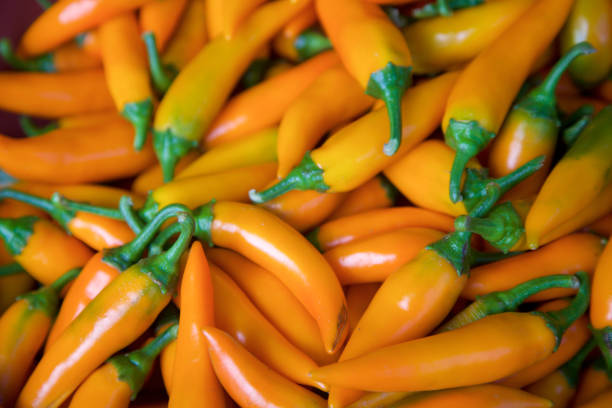Description
The "Bulgarian Carrot" cultivar of Capsicum sp. offers gardeners a vibrant addition with its distinctive carrot-shaped peppers that mature to a bright orange hue. These chillies pack a punch, landing in the heat range of 5,000 to 30,000 Scoville Heat Units (SHU), and add a fruity, slightly tangy flavour to dishes. The plant is adorned with subtle white flowers during the Birak to Bunuru season (late spring to summer), elevating the visual appeal of gardens and balconies alike.
Suited to both in-ground planting and container growth, including vege/herb gardens, this small shrub loves the full sun and appreciates regular watering, especially during the warmer Bunuru (summer) period. For those planting in sandy soils, incorporating a quality soil conditioner will significantly benefit its growth and yield. Applying a potassium-rich fertiliser in the Djilba season (early spring) ensures a bountiful harvest. Typically, about 70 days post-planting, once the chillies adopt their radiant orange tone, they're ripe for the picking. For those sensitive to chilli heat, handle with care and consider using gloves, especially when preparing them for culinary use.
| Botanical Name | Capsicum annuum |
| Common Name | Chilli Pepper |
| Cultivar | Bulgarian Carrot |
|
Classification |
Herbs and Veges |
| PBR Name | |
| Origin | North, Central, South America |
| Foliage | Evergreen |
| Height | Chilli plants generally grow 60 cm - 1 M |
| Width | Chilli plants generally grow 60 cm - 1 M |
| Light | Full sun |
| Soil | Well-draining, good quality soil is important for good fruit-set. |
| Water Requirement | Though Chilli plants are tolerant of low water, they will fruit better with regular water in warm weather. Reducing watering when fruit is ripening can increase heat levels in the fruit. |
| Lifespan | Perennial |
| Flower Colour | White |
| Flower Time | Depending on when the plant is germinated. Generally flowers from Birak (early summer) to Djeran (autumn) |
| Toxicity | Chilli plants contain Capsaicin, the higher the Scoville Heat Unit (SHU) score, the more capsaicin the plant contains. Capsaicin is toxic to most animals if ingested. Humans can tolerate capsaicin, however it can be toxic at high enough levels, so caution must be taken when ingesting chillis. Capsaicin is also harmful to sensitive areas of the skin in humans and animals. Special care should be taken to avoid the eyes, nasal passage and groin in particular. |
Disclaimer:
Information is intended as a guide only.
Unless otherwise stated, all images are examples only and not photos of the actual plants for sale.
Licensed images are used with permission of the license holder.
Payment & Security
Your payment information is processed securely. We do not store credit card details nor have access to your credit card information.

